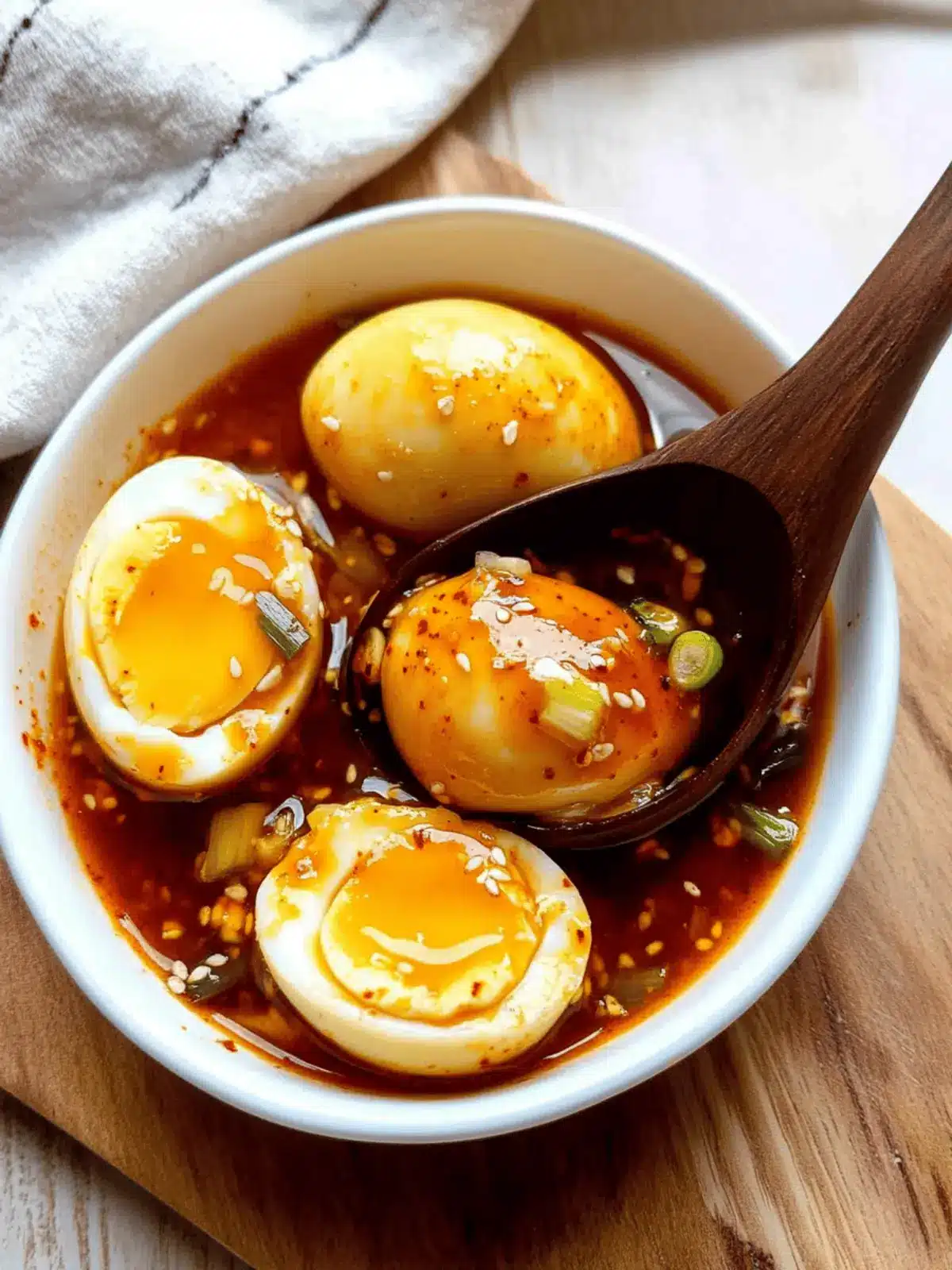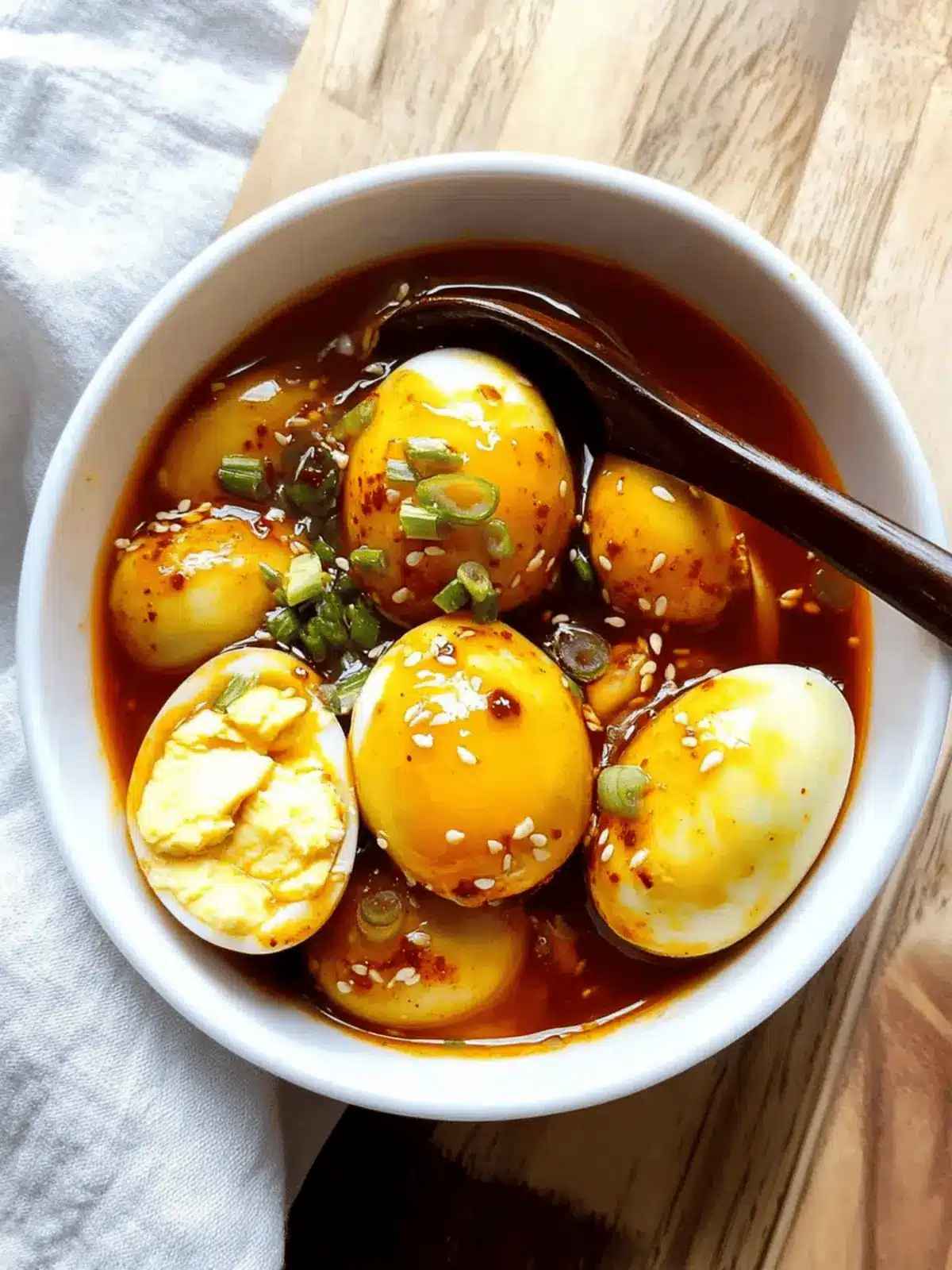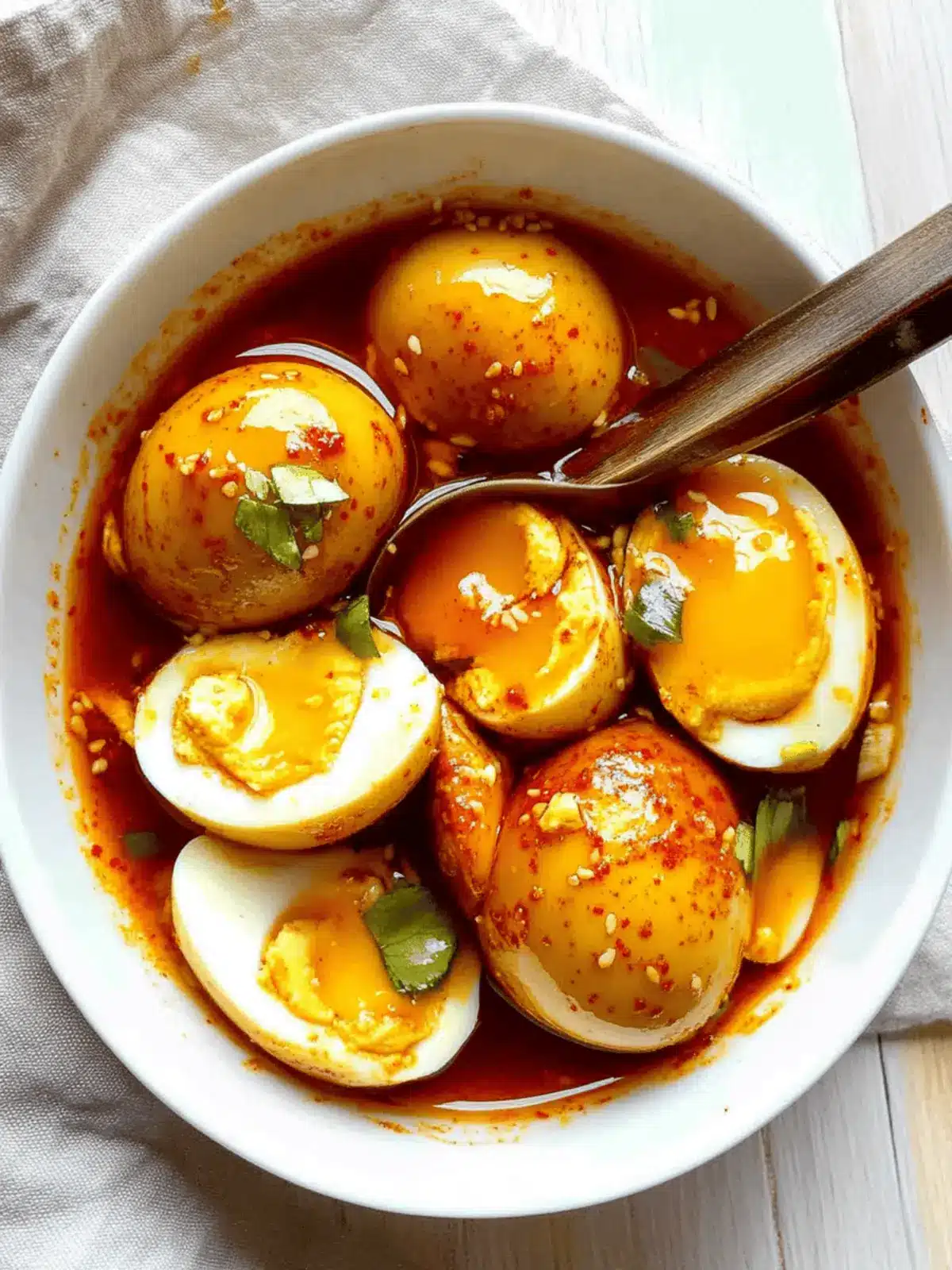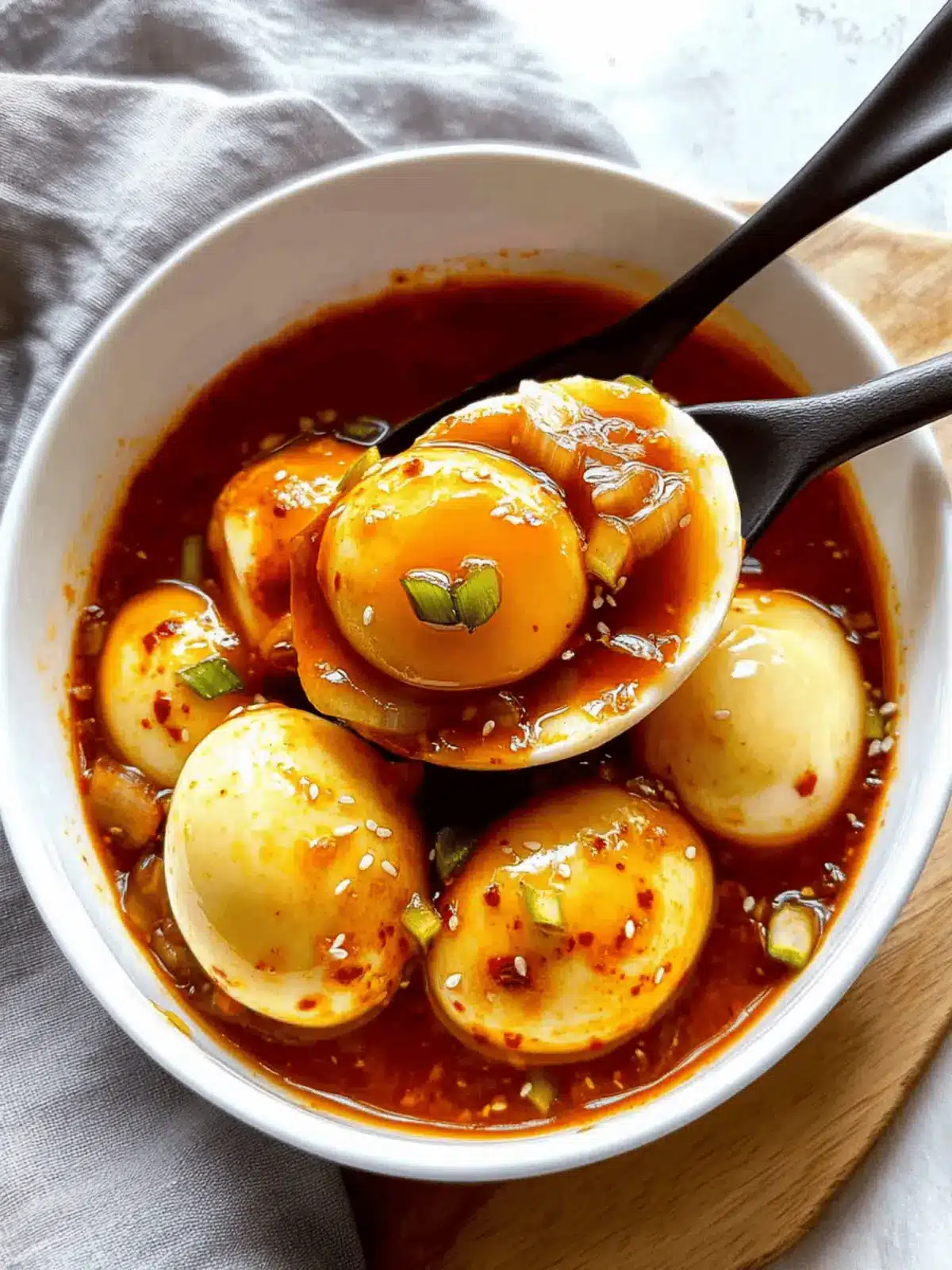Have you ever stumbled upon a dish so delightful that it instantly transforms your mealtime routine? That’s exactly what happened to me when I first tried these Spicy Gochujang Eggs. With their burst of umami flavor and a hint of sweetness, they remind me of a comforting Korean shakshuka that’s perfect for any occasion.
Imagine the rich aroma of garlic sizzling while a silky sauce, made with the beloved gochujang, envelops perfectly jammy eggs. This dish is not only quick and easy to whip up but also versatile enough to be served as a stunning side or a satisfying light meal. It has quickly become a go-to in my kitchen, especially on those busy weeknights when I crave something comforting yet exciting.
Join me as I lay out the steps to create this indulgent recipe, which will awaken your love for homemade food and whisk you away on a flavor adventure. Whether you’re a fan of spicy cuisine or just looking to elevate your egg game, these Spicy Gochujang Eggs are about to become your new favorite dish!
Why are Spicy Gochujang Eggs so irresistible?
Unique Flavor Explosion: These Spicy Gochujang Eggs marry sweet, umami, and spicy notes, creating a taste that excites your palate.
Quick & Easy: This recipe comes together in under 30 minutes, making it perfect for weeknight dinners.
Versatile Options: Enjoy them as a side dish, over rice, or even with noodles for a hearty meal.
Crowd-Pleasing: Great for family gatherings or a simple meal prep, everyone will love this dish!
Comforting & Satisfying: The silky sauce pairs beautifully with the jammy eggs, offering both comfort and richness.
For even more flavor, consider toning down the spice and trying them with additional veggies or different proteins. You won’t want to miss out on elevating your egg dishes with this delightful twist!
Spicy Gochujang Eggs Ingredients
For the Eggs
• Large Eggs – Perfect for a protein-packed base; adjust boiling time for desired doneness.
For the Sauce
• Gochujang – This fermented chili paste adds a sweet and spicy flavor profile; no direct substitute, but use chili paste for less sweetness.
• Soy Sauce – Enhances umami and saltiness; gluten-free soy sauce or tamari works well as a substitute.
• Sugar – Balances the heat of gochujang; honey or agave can be used for a different sweetness.
• Rice Vinegar – Adds the necessary acidity to balance flavors; white vinegar can work in a pinch.
• Chicken Stock (or Water) – Provides a flavorful liquid base for the sauce; swap for vegetable stock for a vegetarian option.
• Neutral Oil – Used for cooking the garlic and creating the sauce; consider sesame oil for added flavor.
• Garlic (minced) – Imparts a warm, aromatic flavor; fresh ginger can provide a different aromatic profile.
For Garnishing
• Scallion (sliced) – Adds freshness and a pop of color; fresh herbs like cilantro or parsley can be delightful alternatives.
• Toasted Sesame Seeds – Adds crunch and nutty flavor; these are optional for those with nut allergies.
Now, gather these ingredients to create your own delicious batch of Spicy Gochujang Eggs that will delight your taste buds and warm your heart!
How to Make Spicy Gochujang Eggs
-
Boil the Eggs: Bring a pot of water to a rolling boil. Carefully add the eggs, cooking them for exactly 7 minutes. Cover the pot until boiling resumes, then reduce the heat to low.
-
Prepare an Ice Bath: While the eggs are boiling, fill a bowl with ice water. As soon as the 7 minutes are up, transfer the eggs to the ice bath to stop the cooking process. Let them cool for a few minutes before peeling.
-
Mix the Sauce: In a mixing bowl, combine gochujang, soy sauce, sugar, rice vinegar, and chicken stock (or water). Stir until well blended, creating a rich and flavorful sauce.
-
Cook the Garlic: Heat the neutral oil in a skillet over medium-high heat. Once hot, add minced garlic and sauté for about 15 seconds until fragrant, being careful not to burn it.
-
Simmer the Sauce: Pour the sauce mixture into the skillet with the garlic. Bring to a simmer and let it cook, allowing the flavors to meld beautifully for about 3 to 5 minutes.
-
Add the Eggs: Gently add the peeled eggs to the sauce. Cook for an additional 3 minutes, occasionally rotating the eggs to ensure they are well-coated in the sweet umami sauce.
-
Serve: Plate the eggs over a bed of steamed rice, garnishing with sliced scallions and a sprinkle of toasted sesame seeds for that perfect finish!
Optional: For a touch of freshness, add some chopped cilantro or parsley before serving.
Exact quantities are listed in the recipe card below.
Spicy Gochujang Eggs Variations & Substitutions
Customize your Spicy Gochujang Eggs to match your cravings and pantry staples!
-
Vegan Delight: Substitute eggs with firm tofu, marinating it in the gochujang sauce for a similar flavor. It’s a delightful twist that retains that rich umami kick.
-
Spice It Up: Increase the amount of gochujang or add fresh sliced chili peppers for an extra kick. For heat-lovers, this variation adds a fiery warmth that engages the taste buds.
-
Gluten-Free: Use tamari instead of regular soy sauce to cater to gluten sensitivities. This change keeps all the umami flavor while being friendly to gluten-free diets.
-
Sweet Alternatives: Swap out sugar for honey or maple syrup to introduce a different type of sweetness. Depending on your preference, this can enhance the dish’s complexity beautifully.
-
Herb Infusion: Incorporate fresh herbs like cilantro or basil into the sauce for additional flavor. The herbal notes can elevate the dish and add a refreshing dimension.
-
Zesty Twist: Replace rice vinegar with lime or lemon juice for a zesty brightness. This change brightens up the flavors and makes each bite sing!
-
Add Vegetables: Toss in some sautéed spinach or bok choy during the sauce simmering phase for added nutrition and a vibrant look. The greens offer a nice texture contrast and a burst of freshness.
-
Creamy Element: Add a dollop of yogurt or sour cream when serving for a creamy finish that contrasts beautifully with the spicy notes. This may just become your new favorite topping!
Expert Tips for Spicy Gochujang Eggs
-
Perfect Timing: Adjust boiling times to your preference: 6 minutes for runny yolks, 7 for jammy, and 9 for hard-boiled.
-
Ice Bath Necessity: Don’t skip the ice bath! This step ensures easy peeling of eggs and prevents overcooking.
-
Sauce Simmer: Allow the sauce to simmer before adding eggs. This helps the flavors to intensify for those delicious Spicy Gochujang Eggs.
-
Rotate for Flavor: Gently rotate the eggs while they cook in the sauce. This ensures even flavor absorption for a mouthwatering experience.
-
Garnish Ideas: For a beautiful presentation, consider fresh herbs like cilantro or parsley in addition to scallions for that fresh finish.
What to Serve with Spicy Gochujang Eggs?
To elevate your mealtime experience, consider these delightful accompaniments that beautifully complement the bold flavors of Spicy Gochujang Eggs.
- Steamed Jasmine Rice: The fluffy, fragrant rice soaks up the spicy umami sauce, creating a harmonious blend of flavors in each bite.
- Sesame Spinach Salad: This refreshing salad introduces a crisp texture and vibrant green color, balancing the rich sauce remarkably well.
- Kimchi: The tangy fermented vegetables provide a delightful contrast to the eggs’ spiciness, enhancing the overall Korean-inspired experience.
- Garlic Noodles: Tossed in a savory sauce, these noodles absorb every bit of flavor while adding a satisfying bite to your meal.
- Cucumber Pickles: Crisp and crunchy pickles add a refreshing note that cuts through the richness of the eggs, brightening each mouthful.
- Roasted Sweet Potatoes: Their natural sweetness pairs with the spiciness of the gochujang, rounding out the meal with contrasting flavors and textures.
Pair these dishes with your Spicy Gochujang Eggs for a delightful feast that will tantalize your taste buds and impress your family!
How to Store and Freeze Spicy Gochujang Eggs
Fridge: Store leftover Spicy Gochujang Eggs in an airtight container for up to 5 days to keep them fresh and flavorful.
Freezer: If you want to freeze the eggs, do so after cooking, allowing them to cool completely. Wrap each egg individually in plastic wrap, and store them in a freezer-safe bag for up to 3 months.
Reheating: When ready to enjoy, thaw the eggs in the refrigerator overnight. Reheat gently in a skillet over low heat, adding a splash of water or broth to prevent drying out.
Serving Reminder: Remember to garnish with fresh scallions and sesame seeds after reheating to bring back that delightful presentation!
Make Ahead Options
These Spicy Gochujang Eggs are perfect for busy home cooks who want to save time without sacrificing flavor! You can prepare the sauce and boil the eggs up to 24 hours in advance. Simply store the sauce in an airtight container in the refrigerator, and peel the eggs, placing them in a separate container. When you’re ready to serve, gently reheat the sauce in a skillet and add the eggs, simmering for about 3-5 minutes until heated through. This method will ensure your Spicy Gochujang Eggs remain just as delicious and flavorful while making mealtime a breeze during hectic weekdays!
Spicy Gochujang Eggs Recipe FAQs
What is the best way to select eggs for Spicy Gochujang Eggs?
Absolutely! When selecting eggs, look for large eggs that have a fresh appearance—preferably ones with a clean shell and no cracks. If possible, choose eggs from a local farm or organic source for the best quality and flavor. Check the pack date and use the freshest ones you can find for a superior taste in your dish.
How should I store leftover Spicy Gochujang Eggs?
Very good question! To maintain their flavor and texture, store leftovers in an airtight container in the refrigerator. You can keep them fresh for up to 5 days. Always reheat them gently on the stove over low heat to avoid overcooking the eggs further.
Can Spicy Gochujang Eggs be frozen?
Yes! To freeze, allow the cooked eggs to cool completely first. Wrap each egg individually in plastic wrap and place them in a freezer-safe bag. They can be stored for up to 3 months. When you’re ready to eat them, thaw in the refrigerator overnight and reheat gently on the stove, adding a splash of broth or water to keep them moist.
What should I do if the eggs are too hard-boiled?
If you’ve overcooked the eggs and they are too hard, don’t worry! You can make a delicious spicy egg salad. Just chop the eggs and mix them with some mayonnaise, a bit of gochujang, diced scallions, and seasonings. Serve it on toast or as a filling for a sandwich!
Are there any dietary considerations for Spicy Gochujang Eggs?
Certainly! If you have allergies, be sure to check the ingredient labels for gochujang, as some brands might contain gluten or other allergens. For a vegan version, I often recommend substituting the eggs with firm tofu marinated in the sauce for a similar flavor profile. It’s a delightful option that everyone can enjoy!
What is the best way to tell if my eggs are fresh?
Great question! To test the freshness of your eggs, fill a bowl with water and gently place the eggs inside. Fresh eggs will sink to the bottom and lay flat on their sides. If an egg stands upright or floats, it’s best to discard it as it’s no longer fresh.

Spicy Gochujang Eggs: A Sweet Umami Twist to Savor
Ingredients
Equipment
Method
- Boil the Eggs: Bring a pot of water to a rolling boil. Carefully add the eggs, cooking them for exactly 7 minutes. Cover the pot until boiling resumes, then reduce the heat to low.
- Prepare an Ice Bath: While the eggs are boiling, fill a bowl with ice water. As soon as the 7 minutes are up, transfer the eggs to the ice bath to stop the cooking process. Let them cool for a few minutes before peeling.
- Mix the Sauce: In a mixing bowl, combine gochujang, soy sauce, sugar, rice vinegar, and chicken stock (or water). Stir until well blended, creating a rich and flavorful sauce.
- Cook the Garlic: Heat the neutral oil in a skillet over medium-high heat. Once hot, add minced garlic and sauté for about 15 seconds until fragrant, being careful not to burn it.
- Simmer the Sauce: Pour the sauce mixture into the skillet with the garlic. Bring to a simmer and let it cook, allowing the flavors to meld beautifully for about 3 to 5 minutes.
- Add the Eggs: Gently add the peeled eggs to the sauce. Cook for an additional 3 minutes, occasionally rotating the eggs to ensure they are well-coated in the sweet umami sauce.
- Serve: Plate the eggs over a bed of steamed rice, garnishing with sliced scallions and a sprinkle of toasted sesame seeds for that perfect finish!








